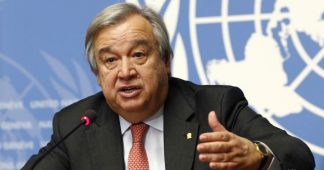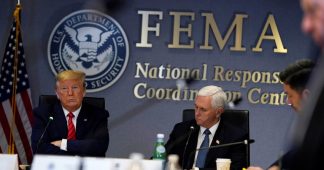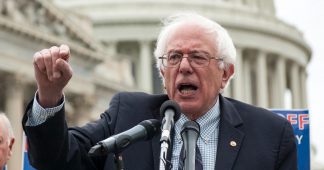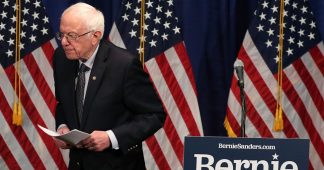James K. Galbraith Says More…
Nov. 17, 2020
This week in Say More, PS talks with James K. Galbraith, Professor of Government and Chair in Government/Business Relations at the Lyndon B. Johnson School of Public Affairs at the University of Texas at Austin.
Project Syndicate: In March, when the COVID-19 crisis was just beginning in the United States, you noted that, when the Japanese attacked Pearl Harbor, the country responded quickly and resolutely. You argued that, when it came to the pandemic, “there [was] not a moment to lose” in mounting a similar all-of-society response. By the time Joe Biden takes office, the US will have lost nearly ten months. Will it be too late for an effective response?
James K. Galbraith: The success of public-health policies in curbing COVID-19 infections and deaths depended on advance preparation and immediate action. A range of governments – including New Zealand, South Korea, Vietnam, Singapore, Cuba, and Taiwan – reacted to the news about the initial outbreak in Wuhan, China, in early January, in most cases mobilizing existing state structures, such as special ministry-level task forces. China itself was only a few weeks behind, and when it mobilized, it did so forcefully, essentially eliminating the virus within a few months. A few European countries – notably Slovakia and Greece – also had a strong initial response. .
The worst performers tended to be large, decentralized, politically polarized countries and regions, including Brazil, the European Union as a whole, Russia, the United Kingdom, India, and the United States. In these places, the pandemic will continue to take a serious toll, pending effective vaccines and therapies. With safer individual behaviors, such as social distancing and mask wearing, it can be slowed, but not stopped.
As for the economic effects, the US has experienced the partial rebound I predicted in March. But I believe now, as then, that this will be followed by a long struggle, for three fundamental reasons, beyond the pandemic itself. First, there is the collapse in global investment, which affects the economy’s advanced sectors. Second, the impulse to save in the face of economic anxiety will devastate services providers, and the jobs and incomes they provide, affecting millions of workers. And, third, unpayable debts are piling up, affecting the entire system.Trump may have lost the election, but truly effective responses still lie outside the scope of the current political debate. One may safely predict, therefore, that they will not be pursued – at least not until facts force ideas to change.
PS: In January, you examined the economic-policy program of Bernie Sanders, the democratic socialist senator from Vermont who was then vying for the Democratic presidential nomination. Biden derided many of Sanders’s ideas as unrealistic during the primaries. But he also has a track record of adjusting his position to the Democratic mainstream, and the pandemic has shifted political discourse to the left, especially with regard to social safety nets and state economic support. Beyond the immediate COVID-19 response, which aspects of Sanders’s economic-policy agenda is the Biden administration most likely to embrace?
JG: Though Biden won in the end, the election was a poor showing for the donor-dominated Democratic Party, and the prospects for effective economic policy are bleak. The progressive goal now should be to define a wide-ranging agenda. Beyond measures to address COVID-19, this should include an energy transformation, improved infrastructure, a job guarantee, universal health care, a $15 minimum wage, union rights, and mechanisms for debt restructuring that prevent families from losing their homes. Progressives should ignore the tired chatter about “excessive” deficits and public debt, and, to tackle inequality, they should vote to increase the top income tax rates and restore the bite of the estate and gift taxes.
Progressives should also work to end America’s wars, eliminate nuclear weapons, and cut the military budget. They should reject pressure to pose as “getting tough” with Russia and China – exercises in futility, at best – let alone to start new wars against Iran or Venezuela. A strategy of initiative and imagination, of peace and reconstruction, is the best politics now. It will foster a new generation of political activists, help rejuvenate the Democratic Party, and lay the foundation for gains at the polls in two years, and perhaps for a progressive victory in four.
PS: In September, you criticized three recent studies of the sources of Americans’ discontent, writing that while there was “something to each,” all had major weaknesses and blind spots, and fell short when it came to offering solutions. If you wrote a book on this topic, which under-recognized forces and trends would you be most keen to investigate, and which theories and concepts would be most useful to the task?
JG: The weakness shared by all three of those books was that they pulled their punches on policy. The US economy is not an equilibrium engine (or system) that needs only a bit of tinkering and some fuel (stimulus) to keep it going. We are in serious trouble, and nothing is guaranteed. The only way to address the sources of discontent is with far-reaching changes that recognize the severity of the health crisis, the poor state of economic and environmental conditions, and the country’s declining relative power. This is why today’s rhetoric – which depicts “recovery” as inevitable – is so misleading.The recourse to economic experts compounds the problem. I have been teaching about the pandemic this semester. One big lesson I’ve learned through discussions with my students is how much this crisis runs against the ethos of our learned approach to policy. We have made a cult of research and “evidence-based decision-making,” and so, in this situation, of calculating imaginary “trade-offs” between the epidemic and the economy. But at the moment – just as in the situation President Franklin D. Roosevelt and the New Dealers confronted in 1933 – there is not much definitive evidence to go on, beyond the basics of epidemiology, and what matters most is how people respond to guidance and leadership. Decisions and actions must therefore be based on judgment, passion, conviction, belief, and hope.
Read more at https://www.project-syndicate.org/say-more/an-interview-with-james-k-galbraith-2020-11?barrier=accesspaylog











